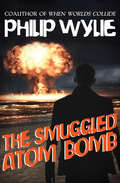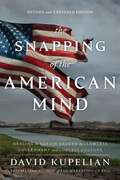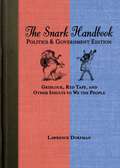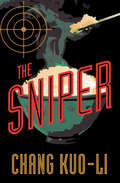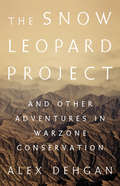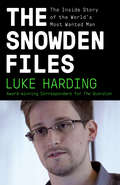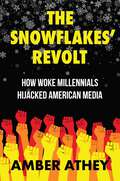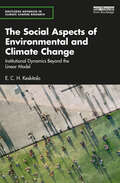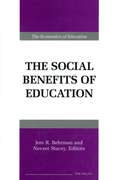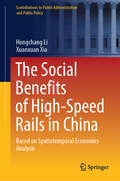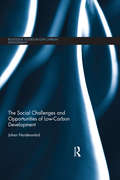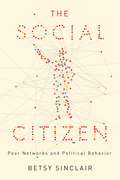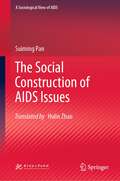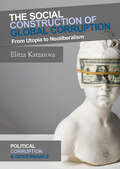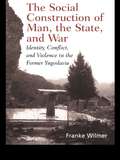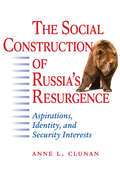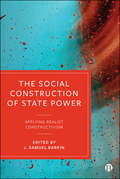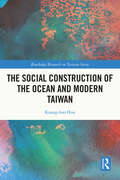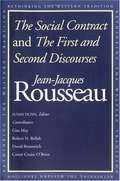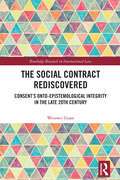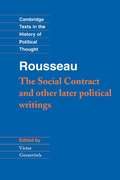- Table View
- List View
The Smuggled Atom Bomb
by Philip WylieA graduate student stumbles across an insidious plot to unleash nuclear terror on America's greatest cities in a blood-chillingly prescient tale from one of thriller fiction's twentieth-century masters Personable, good-looking, and a whiz at physics, graduate student Allan Diffenduffer "Duff" Bogan has a bright future ahead of him. But while staying at the home of an invalid widow in Florida, Duff makes a discovery that freezes his blood: a cache of uranium hidden in the locked closet of a fellow guest. The FBI is initially skeptical, but Duff knows all too well what his findings portend. Suddenly, not only is his future in jeopardy, the fate of millions of Americans hangs in the balance as well. If he cannot expose the horrific plot his nation's enemies set in motion years before, entire cities will be reduced to piles of radioactive rubble in an unthinkable nuclear nightmare stretching from coast to coast. And time, it seems, is rapidly running out.
The Snapping of the American Mind: Healing a Nation Broken by a Lawless Government and Godless Culture
by David KupelianAmerica the beautiful has become America the bizarre.REVISED AND EXPANDED EDITION! "A must-read if you really want to understand the world we live in and where it's headed." – SEAN HANNITY "David Kupelian's The Snapping of the American Mind chronicles the decline and fall of America and shows that it is no accident, but rather a direct result of progressive misrule?an eye-opening, scary and galvanizing book." – DINESH D'SOUZA "David Kupelian has once again given us a must-read in these times of political turbulence and cultural insanity." – PAUL KENGOR America the beautiful has become America the bizarre. Government promotes shockingly deranged policies while purposely turning citizens against each other, Christians are prosecuted as criminals, children "transition" to the opposite sex, crime skyrockets and 130 million Americans depend on mind-altering substances just to get through life. Turbocharged by the Obama presidency and continuing into the present day, long-coalescing forces of the political and cultural Left are bringing about their much-heralded "fundamental transformation of America." That much everyone knows. But this revolution is also causing a fundamental transformation of Americans in profoundly negative ways. In The Snapping of the American Mind, veteran journalist and bestselling author David Kupelian shows how the progressive Left which today dominates America's key institutions, from the news and entertainment media, to Big Tech, to education, to government itself is accomplishing much more than just enlarging government, redistributing wealth, and de-Christianizing the culture. With the Left's wild celebration of sexual anarchy, its intimidating culture of political correctness, and its incomprehension of the fundamental sacredness of human life, it is also, whether intentionally or not, promoting widespread dependency, debauchery, family breakdown, crime, corruption, addiction, despair, and suicide. Surveying this growing chaos in American society, Kupelian exposes both the utopian revolutionaries and their extraordinary methods that have turned America's most cherished values literally upside down to the point that madness is celebrated and normality demonized.
The Snares: A Novel
by Rav Grewal-KökA Punjabi American lawyer at a mysterious federal intelligence agency fights to keep his career, marriage, and morality intact in this gripping post-9/11 drama from a thrilling new voice. &“Here is, at long last, our immigrant John le Carré. . . . Rav Grewal-Kök is a fearless and visionary writer.&”—Xuan Juliana Wang, author of Home Remedies&“Are you happy where you are? Toiling in the trenches of the Justice Department?&”In the waning months of George W. Bush&’s presidency, Neel Chima, a former naval officer and federal prosecutor, is recruited to join a new federal intelligence agency—one with greater than usual powers and fewer than usual restrictions. Neel soon finds himself intimately involved in the surveillance of domestic terrorism suspects and the selection of foreigners for drone assassination—men who often look just like his Sikh family members. As both his ambitions and his moral qualms mount, he is drawn farther and farther away from his wife and two young daughters. When he makes a critical mistake at work, he is left vulnerable to shadowy figures in the intelligence world who seek to use him in their own, still more radical counterterrorism missions. If he agrees, the world of power will open up even wider to him. If he doesn&’t . . .Is Neel an insider or an outsider? The hunter or the hunted? An idealist or a mercenary? What truths, and whose lives, is he willing to sacrifice? The novel plunges readers into the human turmoil behind the faceless operations—the torture, secret assassinations, and drone strikes—of the American security state, creating an eye-opening meditation on morality, violence, and the price of a human soul.
The Snark Handbook: Politics and Government Edition (Snark Series)
by Lawrence DorfmanAnother political year is upon us . . . a year in which we elect another useless figurehead to piss off the masses, confuse the classes, and, above all, reward the jackasses. It will be a time of fear, angst, and anger, the perfect moment for The Snark Handbook: Politics and Government Edition. Filled with quotes, jokes, and timeless snarks, this brave foray into the political theater, old and new, will serve as a priceless source of sanity as you navigate the asylum. In the same inimitable style as the previous bestselling Snark titles, this timely entry is guaranteed to amuse and entertain. The wit and humor of Lawrence Dorfman shines in this collection, where he highlights the ineptitude and malice that is American democracy. You'll see first-hand the shenanigans that started with our Founding Fathers and still continue bravely on today. Hail to the Chief!
The Sniper
by Kuo-Li ChangJason Bourne meets John McClane in this electrifying thriller about a special-forces sniper and a seasoned homicide detective who get caught up in a criminal conspiracy that involves the highest levels of power. Twelve days before retirement, Taipei police detective Wu is handed a curious case: a naval officer has been found dead in his hotel room. While it is immediately apparent to Wu that the officer has been murdered, the military insist it was suicide and want the case closed with no questions asked. Soon, however, more high-ranking officers turn up dead, and Wu realizes he has a full-blown conspiracy on his hands. Meanwhile in Italy, Alex, a young Taiwanese sniper, ex-Marine, ex–French Foreign Legion, and currently a fried-rice chef in Manarola, is called back into service. Ordered by his handler to assassinate a high-level Taiwanese government advisor in Rome, he soon finds himself on the run, hunted across Europe by his old brothers-in-arms.
The Snow Jewel: The Snow Jewel (The Rescue Princesses #5)
by Paula HarrisonThese are no ordinary princesses--they're Rescue Princesses!Northernland is the snowiest kingdom the Rescue Princesses have ever visited. They are delighted to go sledding, drink hot cocoa, and make friends with the girl who lives there, Princess Freya. When Princess Freya's mischievous kitten goes missing, the princesses leap into action. They have to find the kitten-even if it means letting Freya in on their Rescue Princess secret.
The Snow Leopard Project: And Other Adventures in Warzone Conservation
by Alex DehganThe remarkable story of the heroic effort to save and preserve Afghanistan's wildlife-and a culture that derives immense pride and a sense of national identity from its natural landscape.Postwar Afghanistan is fragile, volatile, and perilous. It is also a place of extraordinary beauty. Evolutionary biologist Alex Dehgan arrived in the country in 2006 to build the Wildlife Conservation Society's Afghanistan Program, and preserve and protect Afghanistan's unique and extraordinary environment, which had been decimated after decades of war.Conservation, it turned out, provided a common bond between Alex's team and the people of Afghanistan. His international team worked unarmed in some of the most dangerous places in the country-places so remote that winding roads would abruptly disappear, and travel was on foot, yak, or mule. In The Snow Leopard Project, Dehgan takes readers along with him on his adventure as his team helps create the country's first national park, completes the some of the first extensive wildlife surveys in thirty years, and works to stop the poaching of the country's iconic endangered animals, including the elusive snow leopard. In doing so, they help restore a part of Afghan identity that is ineffably tied to the land itself.
The Snowden Files
by Luke HardingIT BEGAN WITH A TANTALIZING, ANONYMOUS EMAIL: "I AM A SENIOR MEMBER OF THE INTELLIGENCE COMMUNITY." What followed was the most spectacular intelligence breach ever, brought about by one extraordinary man. Edward Snowden was a 29-year-old computer genius working for the National Security Agency when he shocked the world by exposing the near-universal mass surveillance programs of the United States government. His whistleblowing has shaken the leaders of nations worldwide, and generated a passionate public debate on the dangers of global monitoring and the threat to individual privacy. In a tour de force of investigative journalism that reads like a spy novel, award-winning Guardian reporter Luke Harding tells Snowden's astonishing story--from the day he left his glamorous girlfriend in Honolulu carrying a hard drive full of secrets, to the weeks of his secret-spilling in Hong Kong, to his battle for asylum and his exile in Moscow. For the first time, Harding brings together the many sources and strands of the story--touching on everything from concerns about domestic spying to the complicity of the tech sector--while also placing us in the room with Edward Snowden himself. The result is a gripping insider narrative--and a necessary and timely account of what is at stake for all of us in the new digital age.From the Trade Paperback edition.
The Snowden Files: The Inside Story of the World's Most Wanted Man
by Luke HardingIT BEGAN WITH A TANTALIZING, ANONYMOUS EMAIL: "I AM A SENIOR MEMBER OF THE INTELLIGENCE COMMUNITY." What followed was the most spectacular intelligence breach ever, brought about by one extraordinary man. Edward Snowden was a 29-year-old computer genius working for the National Security Agency when he shocked the world by exposing the near-universal mass surveillance programs of the United States government. His whistleblowing has shaken the leaders of nations worldwide, and generated a passionate public debate on the dangers of global monitoring and the threat to individual privacy. In a tour de force of investigative journalism that reads like a spy novel, award-winning Guardian reporter Luke Harding tells Snowden's astonishing story--from the day he left his glamorous girlfriend in Honolulu carrying a hard drive full of secrets, to the weeks of his secret-spilling in Hong Kong, to his battle for asylum and his exile in Moscow. For the first time, Harding brings together the many sources and strands of the story--touching on everything from concerns about domestic spying to the complicity of the tech sector--while also placing us in the room with Edward Snowden himself. The result is a gripping insider narrative--and a necessary and timely account of what is at stake for all of us in the new digital age.
The Snowflakes' Revolt: How Woke Millennials Hijacked American Media
by Amber AtheyThe &“snowflake&” generation of college students didn&’t simply melt away as expected, but rather, entered the workforce and hijacked mainstream media, using campus mob intimidation tactics to push America further to the left than ever before.Step onto a college campus, attend a street protest, flip to a legacy news network, tune in to a White House press briefing, and you&’re likely to come down with a bad case of déjà vu. The media—composed almost entirely of liberal elites—along with the Democratic Party and its activists have long worked in tandem to make their ideas palatable to the public. But the media&’s reliance on the left for relevance had an unwanted side effect: it&’s been forced to genuflect to the most radical and most obnoxious—and, unfortunately, very influential—activists. Over the past decade, the zealous individuals once derided as college &“snowflakes&” by the right have taken over key cultural institutions, pushing the national conversation further to the left than ever before. These individuals have cohered into a potent clique that has employed campus mob tactics to orchestrate revolutions (and purges) at the New York Times, major publishing companies, and mega-corporations in Silicon Valley and beyond. Low-level staffers transform into Slacktivists, organizing protests through their company social media channels and WhatsApp group chats, eventually collecting enough digital signatures to wrestle management into submission. Amber Athey has witnessed it all come to fruition. She was the most vocal conservative at Georgetown University when academic freedom was first being suffocated by safe spaces and trigger warnings. After graduation, she covered liberal bias at colleges across the country, binged endless hours of cable news each day as a media reporter, and most recently embedded with the White House press corps as a correspondent. Part memoir, part investigation, and part prescription, this book will expose how modern media influences the American public with the coordinated assistance of left-wing politicians, think tanks, special interest groups, and &“experts.&” Finally, The Snowflakes&’ Revolt will argue that the introduction of petulant radicals to this already volatile concoction will only accelerate the media&’s collapse.
The Social Aspects of Environmental and Climate Change: Institutional Dynamics Beyond a Linear Model (Routledge Advances in Climate Change Research)
by E. C. KeskitaloThe Social Aspects of Environmental and Climate Change critically examines the prominence of natural science framing in mainstream climate change research and demonstrates why climate change really is a social issue. The book highlights how assumptions regarding social and cultural systems that are common in sustainability science have impeded progress in understanding environmental and climate change. The author explains how social sciences theory and perspectives provide an understanding of institutional dynamics including issues of scale, possibilities for learning, and stakeholder interaction, using specific case studies to illustrate this impact. The book highlights the foundational role research into social, political, cultural, behavioural, and economic processes must play if we are to design successful strategies, instruments, and management actions to act on climate change. With pedagogical features such as suggestions for further reading, text boxes, and study questions in each chapter, this book will be an essential resource for students and scholars in sustainability, environmental studies, climate change, and related fields.
The Social Benefits of Education
by Jere R. Behrman Nevzer StaceyFor decades, the primary argument in justifying education has been based on its direct economic effects. Yet education also provides "social benefits" for individuals and society at large, including a better way of taking care of ourselves, and consequently creating a better society to live in. Though it is difficult to quantify these social benefits, a more systematic analysis would improve our understanding of the full effects of education and provide a basis for considering related policies. The Office of Research of the United States Department of Education commissioned a series of papers on measuring these effects of education. Those papers, revised and updated, are collected here. Kenneth J. Arrow provides perspective on education and preference formation, and Jere R. Behrman considers general conceptual and measurement issues in assessing the social benefits of education and policies related to education. These issues are taken up by experts in four fields--health, parenting, the environment, and crime. Themes addressed include measurement issues regarding what we mean by education and its benefits; basic analytical issues in assessing the impact of education on these social benefits using behavioral data; and whether the social benefits of education justify public policy interventions. Jere R. Behrman is William R. Kenan Jr. Professor of Economics, University of Pennsylvania. Nevzer G. Stacey is Senior Research Analyst, Office of Educational Research, U. S. Department of Education.
The Social Benefits of High-Speed Rails in China: Based on Spatiotemporal Economics Analysis (Contributions to Public Administration and Public Policy)
by Hongchang Li Xuanxuan XiaThis book summarizes the quantitative research methods related to the social benefits of high-speed rails. It also explores the political, economic, technological, social and environmental impacts of high-speed rails. As China's new national business card, high-speed railways not only reflect the advanced technology of Chinese railways but also reflect China's increasing comprehensive national power. The highlight of the book is to conduct multidimensional analysis of the social benefits of the high-speed rail with a focus of spatiotemporal economics analysis.
The Social Challenges and Opportunities of Low Carbon Development (Routledge Studies in Low Carbon Development)
by Johan NordensvärdThis book explores the social implications and challenges of low-carbon development. The argument of the book is that a broad understanding of low-carbon development is essential for mitigating climate change and enabling development in a carbon-constrained world, but there are risks that low-carbon development might come at a price that is both social and economic. These risks need to be carefully assessed and reduced. The main aim of the book is to explore, critically analyse and propose different ways of understanding low-carbon development from a social perspective in both developed and developing countries. The author uses concepts such as low-carbon development, social policy, sustainable development and environmental justice to understand the social implications of low-carbon development projects. The book first elaborates the need to understand the social issues and challenges of low-carbon development in both developed and developing countries. It then discusses five contemporary challenges of low-carbon development: the social consequences of Chinese hydropower dams in the Mekong region; the cost of the transition to renewable energies such as wind energy in Germany; the challenges of carbon offsetting in Brazil; the nexus of fuel-inefficient housing and fuel poverty in England; solar power for refugees in Africa. The book fills a crucial gap for researchers, postgraduates, practitioners and policy-makers in the fields of climate change, development and social policy. Johan Nordensvärd is a Lecturer in Social Policy at the University of Southampton, UK.
The Social Citizen: Peer Networks and Political Behavior
by Betsy SinclairHuman beings are social animals. Yet despite vast amounts of research into political decision making, very little attention has been devoted to its social dimensions. In political science, social relationships are generally thought of as mere sources of information, rather than active influences on one's political decisions. Drawing upon data from settings as diverse as South Los Angeles and Chicago's wealthy North Shore, Betsy Sinclair shows that social networks do not merely inform citizen's behavior, they can--and do--have the power to change it. From the decision to donate money to a campaign or vote for a particular candidate to declaring oneself a Democrat or Republican, basic political acts are surprisingly subject to social pressures. When members of a social network express a particular political opinion or belief, Sinclair shows, others notice and conform, particularly if their conformity is likely to be highly visible. We are not just social animals, but social citizens whose political choices are significantly shaped by peer influence. The Social Citizen has important implications for our concept of democratic participation and will force political scientists to revise their notion of voters as socially isolated decision makers.
The Social Construction of AIDS Issues (A Sociological View of AIDS)
by Suiming PanThis book explores AIDS from a relatively macro perspective rather than concrete operational methods and focuses on the social construction of AIDS issues instead of its transmission level in the context of China. First, it begins with the theoretical analysis and the social significance of AIDS, which is different from the simple conflict between different schools of thought. Second, it analyses the contest of various social powers in the process of AIDS construction and conclusion, rather than making different explanations of policies. Last but not least, it elaborates on the central proposition, i.e., the “AIDS issue” is a symbol of China’s social restructuring process. Only in an effort to advance such a process can we be more likely to find the best problem-solving mode, rather than clamouring repeatedly or giving countermeasures alone.
The Social Construction of Global Corruption: From Utopia to Neoliberalism (Political Corruption and Governance)
by Elitza KatzarovaThis book offers new ways of thinking about corruption by examining the two distinct ways in which policy approaches and discourse on corruption developed in the UN and the OECD. One of these approaches extrapolated transnational bribery as the main form of corrupt practices and advocated a limited scope offense, while the other approach tackled the broader structure of the global economic system and advocated curbing the increasing power of multinational corporations. Developing nations, in particular Chile, initiated and contributed much to these early debates, but the US-sponsored issue of transnational bribery came to dominate the international agenda. In the process, the ‘corrupt corporation’ was supplanted by the ‘corrupt politician’, the ‘corrupt public official’ and their international counterpart: the ‘corrupt country’. This book sheds light on these processes and the way in which they reconfigured our understanding of the state as an economic actor and the multinational corporation as a political actor.
The Social Construction of Man, the State and War: Identity, Conflict, and Violence in Former Yugoslavia
by Franke WilmerThe Social Construction of Man, the State, and War is the fist book on conflict in the former Yugoslavia to look seriously at the issue of ethnic identity, rather than treating it as a given, an unquestionable variable. Combining detailed analysis with a close reading of historical narratives, documentary evidence, and first-hand interviews conducted in the former Yugoslavia, Wilmer sheds new light on how ethnic identity is constructed, and what that means for the future of peace and sovereignty throughout the world.
The Social Construction of Russia's Resurgence: Aspirations, Identity, and Security Interests
by Anne L. ClunanShortlisted, 2010 Jospeh Rothschild Prize in Nationalism and Ethnic Studies, Association for the Study of Nationalities.Once again, it appears that Russia is marching to the forefront of the international stage. Anne L. Clunan's analysis of Russia's resurgence convincingly argues that traditional security concerns, historical aspirations, and human agency are coalescing around a new national identity and reconfigured national interests in the post-Soviet nation. Her work moves beyond balance-of-power and realist politics to posit a new, interdisciplinary theory: aspirational constructivism.This groundbreaking theory draws on international relations research and social psychology. Clunan argues that the need for collective self-esteem creates aspirations—often based in a nation's past—that directly shape its national and security interests. In applying this theory to Russia, she points to the nation's continuing efforts to exert influence over former Soviet satellite states and relates the desire for international status found in five broad Russian national self-images—Western, statist, Slavophile, neocommunist, and nationalist—to Russia's definition of its security interests with respect to Europe, Eurasia, and nuclear weapons.Clunan's examination of how sociology, social psychology, and traditional international politics affect post-Soviet Russian identity and security concerns is truly cross-disciplinary. A concluding chapter discusses the policy implications of aspirational constructivism for Russia and other nations and a methodological appendix lays out a framework for testing the theory.
The Social Construction of State Power: Applying Realist Constructivism
by J. Samuel BarkinRealism and constructivism are often viewed as competing paradigms for understanding international relations, though scholars are increasingly arguing that the two are compatible. Edited by one of the leading proponents of realist constructivism, this volume shows what realist constructivism looks like in practice by innovatively combining exposition and critiques of the realist constructivist approach with a series of international case studies. Each chapter addresses a key empirical question in international relations and provides important guidance for how to combine both approaches effectively in research. Addressing future directions and possibilities for realist constructivism in international relations, this book makes a significant contribution to the theorizing of global politics.
The Social Construction of the Ocean and Modern Taiwan (Routledge Research on Taiwan Series)
by Kuang-hao HouThis book interprets the meanings of the uses, regulations, and representations of the ocean undertaken by the state and other societal power sources in modern Taiwan between 1949 and 2016. Following Michael Mann’s historical sociology and Philip Steinberg’s political geography, the book analyses the construction of the ocean by the society of Taiwan in terms of ideological, political, military and economic sources of power. It also provides a structural foundation for creating a framework of the politics in maritime and ocean affairs through the lens of an interpretive analysis of the modern Taiwanese construction of the ocean. Moreover, it explores the social constructions of the ocean through the written works of intellectuals in natural sciences, social studies and humanities in Taiwan after the 1980s. Succinctly revealing how Taiwanese society has influenced the social construction of the ocean, this book will appeal to scholars and students interested in Taiwanese politics and history, political geography and Asian politics.
The Social Contract
by Jean-Jacques Rousseau Maurice CranstonWith the publication of The Social Contract in 1761, Jean-Jacques Rousseau took his place among the leading political philosophers of the Enlightenment. Like his contractarian predecessors (Thomas Hobbes and John Locke), Rousseau sought to ground his political theory in an understanding of human nature, which he believed to be basically good but corrupted by the conflicting interests within society. Here self-interest degenerated into a state of war from which humanity could only be extricated by the imposition of a contract. As a party to the compact, each individual would find his true interest served within the political expression of the community of man, or the "general will."
The Social Contract And The First And Second Discourses
by Susan Dunn Robert N. Bellah Jean-Jacques Rousseau Conor Cruise O'Brien David Bromwich Gita MayJean-Jacques Rousseau's ideas about society, culture, and government are pivotal in the history of political thought. His works are as controversial as they are relevant today. This volume brings together three of Rousseau's most important political writings--The Social Contract and The First Discourse (Discourse on the Sciences and Arts) and The Second Discourse (Discourse on the Origin and Foundations of Inequality)--and presents essays by major scholars that shed light on the dimensions and implications of these texts. Susan Dunn's introductory essay underlines the unity of Rousseau's political thought and explains why his ideas influenced Jacobin revolutionaries in France but repelled American revolutionaries across the ocean. Gita May's essay discusses Rousseau as cultural critic. Robert N. Bellah explores Rousseau's attempt to resolve the tension between the individual's desire for freedom and the obligations that society imposes. David Bromwich analyzes Rousseau as a psychologist of the human self. And Conor Cruise O'Brien takes on the "noxious," "deranged" Rousseau, excoriated by Edmund Burke but admired by Robespierre and Thomas Jefferson. Written from different, even opposing perspectives, these lucid essays convey a sense of the vital and contentious debate surrounding Rousseau and his legacy. For this edition Susan Dunn has provided a new translation of the Discourse on the Sciences and Arts and has revised a previously published translation of The Social Contract.
The Social Contract Rediscovered: Consent’s Onto-Epistemological Integrity in the Late 20th Century (Routledge Research in International Law)
by Wenwei GuanThe Social Contract Rediscovered conducts a critical analysis of the historical evolution of legitimacy, tracing its development from natural law to positive law and finally to post-modern critiques. It fills a scholarly gap by addressing the overlooked aspect of the consent process.The book begins with a recap of the historical development of social contract theory. It draws from a broad base of jurisprudential and social theories to think through how social contract’s rise and fall forms an integral part of legitimacy’s modernization process from the Enlightenment-driven Industrial Revolution’s global proliferation to the end of the 20th century. It then integrates discussion of consensus construction at three levels: private contract legitimacy, national development consensus, and global modern exchange mechanism in the late 20th century. Rather than ask how state legitimacy is constructed in social contract theory, the book asks what role an individual plays in the process of consensual legitimacy construction. This individual-oriented perspective calls for a jurisprudential construction of “process legitimacy” and consensual legitimacy’s onto-epistemological integrity.Providing a new perspective on the social contract, this book will interest scholars of private law, international trade, and development law.
The Social Contract and Other Later Political Writings
by Jean-Jacques Rousseau Quentin Skinner Raymond Geuss Victor GourevitchThe work of Jean-Jacques Rousseau is presented in two volumes, together forming the most comprehensive anthology of Rousseau's political writings in English. Volume II contains the later writings such as The Social Contract and a selection of Rousseau's letters on important aspects of his thought. The Social Contract has become Rousseau's most famous single work, but on publication was condemned by both the civil and the ecclesiastical authorities in France and Geneva. Rousseau fled and it is during this period that he wrote some of his autobiographical works as well as political essays such as On the Government of Poland. This 1997 volume, like its predecessor, contains a comprehensive introduction, chronology and guide to further reading, and will enable students to obtain a full understanding of the writings of one of the world's greatest thinkers.
